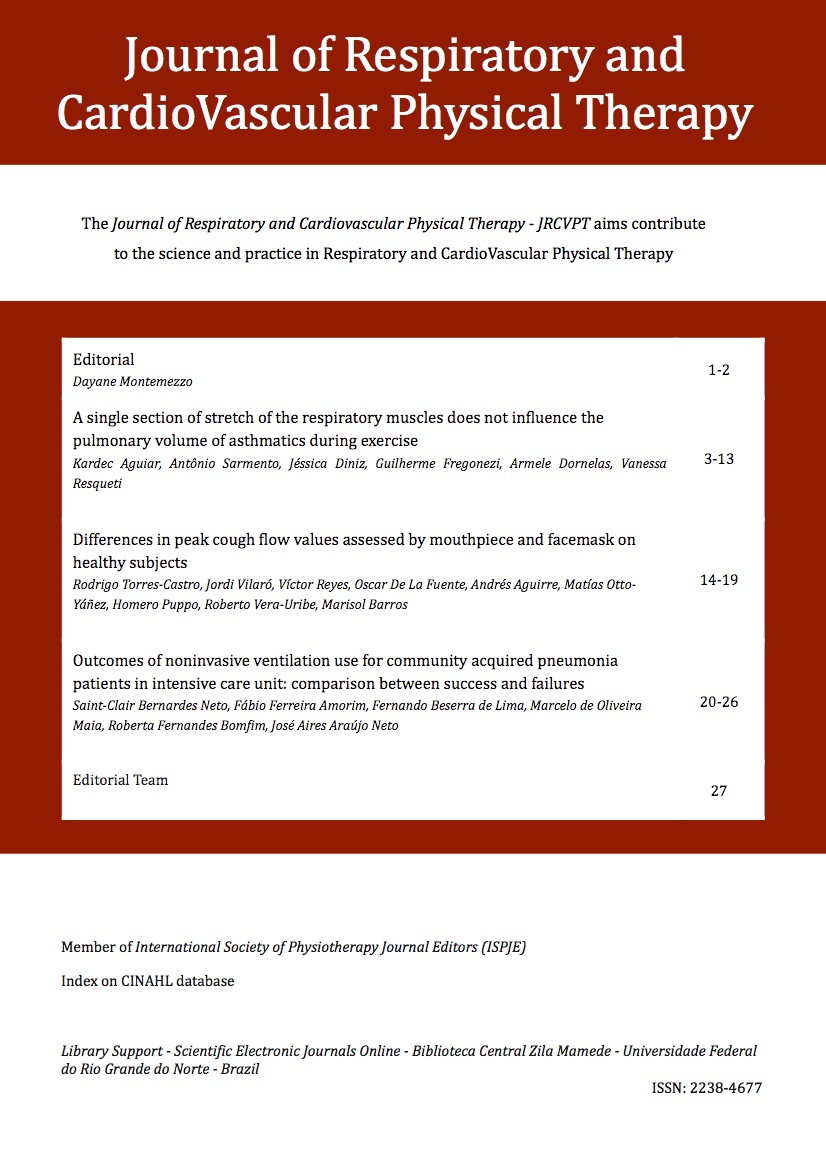Differences in peak cough flow values assessed by mouthpiece and facemask on healthy subjects
Palabras clave:
Peak Cough Flow, cough, facemask, mouthpiece, and neuromuscular diseaseResumen
Background: Coughing is the most important mechanism for evacuating mucus secretions from the airways. Its efficacy directly depends on the Peak Cough Flow (PCF), the maximum air-flow generated during a cough. PCF is used to assess cough in patients with respiratory muscle weakness, mainly in neuromuscular diseases. This measure is performed using a flow meter. However, the literature describes two forms of evaluation: one using a facemask or and the other using a cylindrical mouthpiece and a nose clip.
Objective: To compare the efficacy of measuring the PCF using a cylindrical disposable mouthpiece and a nose clip (PCFmouth) with measurements obtained using a silicone facemask with an inflatable pneumatic border (PCFmask) in healthy adults.
Method: We recruited 34 (16 men) healthy adult subjects that performed the cough maneuver. Three valid maneuvers were performed by each of the subjects to obtain reproducible values. The PCF was measured using both interfaces applied in a random order.
Results: The population characteristics were: mean age 22.1 ± 2.3 years (range 18-29), 11 smokers (32.4%) and 12 subjects (35.3%) performed physical activity at least 3 times per week. The PCFmouth was 4.6% higher than the PCFmask (499.1 ± 114.5 vs. 477.9 ± 94.5 L/min), exhibiting a statistically significant difference (p < 0.01).
Conclusion: In a healthy population, there is a significant difference in PCF values obtained using a mouthpiece with a nose clip versus a facemask. Based on these results, we recommend using a mouthpiece to obtain the best peak cough flow measurement.
Descargas
Descargas
Publicado
Cómo citar
Número
Sección
Licencia
Copyright Transfer Statement
The author(s) of the article, as specified here, hereby transfer(s) to the Revista de Fisioterapia Respirtória e CardioVascular (Journal of Respiratory and CardioVascular Physical Therapy) all copyright ownership rights, title and interests that the author(s) may have or may come to have in and to the article and any revision or version thereof, including, but not limited to, exclusive right to print, publish and sell the article anywhere in the world, in any language and in any media.
This agreement will be considered effective and valid if and when the article is accepted for publication.
If the article contains any copyright-protected material from a third party, the author(s) must obtain written permission to reproduce the said material in the article from the copyright holder and send it to the Revista de Fisioterapia Respirtória e CardioVascular (Journal of Respiratory and CardioVascular Physical Therapy).
The author(s) guarantee(s) the holding of proprietary rights to the article; not having granted or transferred any rights to the article to any other persons or entity; that the article is susceptible to the demand for rights by its author(s); not having infringed upon any author rights, trademark or patent; not having violated the right to privacy or publicity of any person or entity; that the article does not contain any defaming subject; that the factual statements made are true or are based on reasonably accurate research; and, finally, that, the author(s) has/have no reason to believe that any of the formulas, procedures or prescriptions contained in the article will cause damage if used or followed in accordance with the instructions and warnings contained in the article.
The author(s) will indemnify the Revista de Fisioterapia Respirtória e CardioVascular (Journal of Respiratory and CardioVascular Physical Therapy) against any costs, expenses, damages or liability that the Revista de Fisioterapia Respirtória e CardioVascular (Journal of Respiratory and CardioVascular Physical Therapy) may incur as a result of accidental omissions of these guarantees. These representations and guarantees may be extended to a third party by the Revista de Fisioterapia Respirtória e CardioVascular (Journal of Respiratory and CardioVascular Physical Therapy).
Date:
Note: Each author must individually complete and sign this form
1) Author:
Signature: _________________________________
2) Author:
Signature: _________________________________
3) Author:
Signature: _________________________________
4) Author:
Signature: _________________________________
5) Author:
Signature: _________________________________
6) Author:
Signature: _________________________________
7) Author:
Signature: _________________________________
8) Author:
Signature: _________________________________




 English
English Español (España)
Español (España) Português (Brasil)
Português (Brasil) Français (Canada)
Français (Canada)